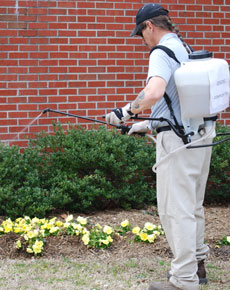By Megan Z. Shearin | September 22, 2010

There’s a new kind of tea being brewed on the campus of Virginia Wesleyan College.
The ingredients are comprised of mainly food scraps such as potato and orange peels, fruits and vegetables. Landscape waste including dry leaves and wood chips are part of the mixture, too.
A partnership between the College’s Dining Services and the Physical Plant has created compost tea, a rich, liquid fertilizer full of nutrients that is being used across campus on flower and shrub beds. This is one of the College’s many sustainability efforts as part of the Marlins Go Green campaign, a campus-wide greening initiative set by the ESC (Environmental Sustainability Council) to improve environmental sustainability at Virginia Wesleyan.
In 2007, the two departments teamed up to begin composting. Appropriate food wastes consisting of mostly fresh vegetable matter, such as items left over from the salad bar each day, were taken to a compost pile in the woods near the Physical Plant and left to break down into their organic compound.
According to Assistant Director of the Physical Plant Mike Rigby the additional step of producing compost tea began in February 2010. A compost tea brewer was made by Chris Houghton, college plumber, using PVC pipe, a garden hose and large trash can, and an air pump.
To brew the tea, the compost is put into a mesh bag and immersed in water infused with unsulfured molasses. A pump aerates the mixture to produce a tea with nutrients and beneficial microbes. The brewing process takes between 18 -24 hours to complete, said Rigby. He added that from the time the food scraps are collected to the break down of material and brewing of the tea the overall process takes 6-8 months.
The Benefits of Compost Tea:
Reduces waste sent to the landfill
Reduces the need for toxic garden chemicals
Provides organic nutrients to plants and soil
Reduces water usage in the dining hall
“Compost tea reduces the amount of waste we send to the landfill, reduces the need for chemical treatments, and provides healthy microbes to plants and soil,” said Rigby. “We can see the value of compost tea and this initiative is a team effort across campus.”
Students, faculty and staff have readily stepped up to contribute to the Marlins Go Green efforts. Last spring, Dining Services initiated a new process called “Scrape Your Plate.” Specialized bins have been created for students to scrape their leftover vegetable and fruit scraps, along with napkins/paper products, before returning their used tableware on the dish conveyor. Additional bins can be found for recycling aluminum, plastic and glass.
“We immediately saw the usage of less water and chemicals in the cleaning process,” said General Manager of Dining Services Tim Lockett. “This saves on water usage, energy and encourages everyone to participate in the campus efforts to reduce our carbon footprint.”
From scraping plates, brewing compost tea and spraying organic fertilizer, the process continues to enhance the campus sustainability efforts.
While the process of compost tea is still fairly new, Rigby said there may be opportunities to expand in the future. For now, “it’s neat to see the fruits of your labor,” he said.

